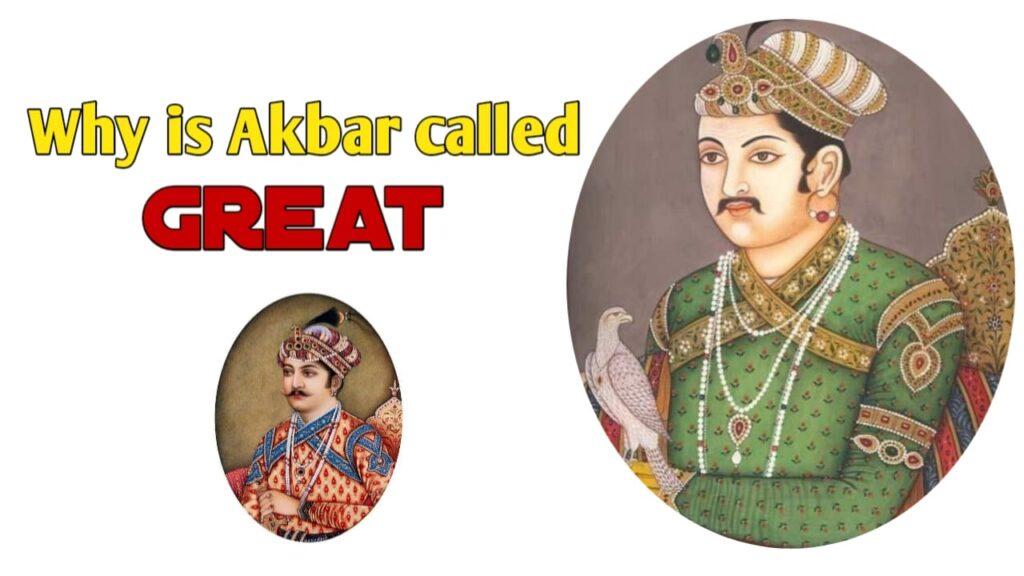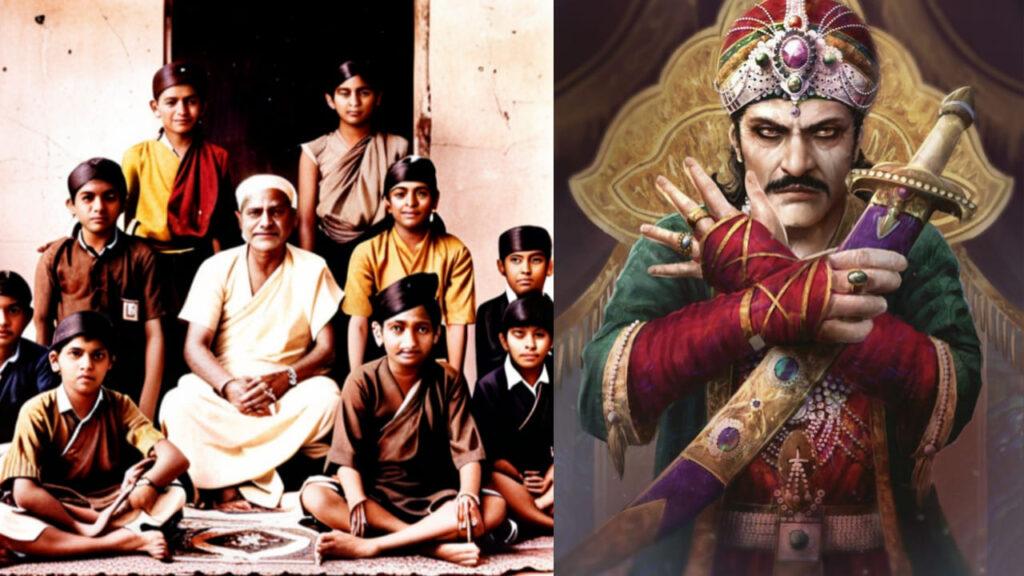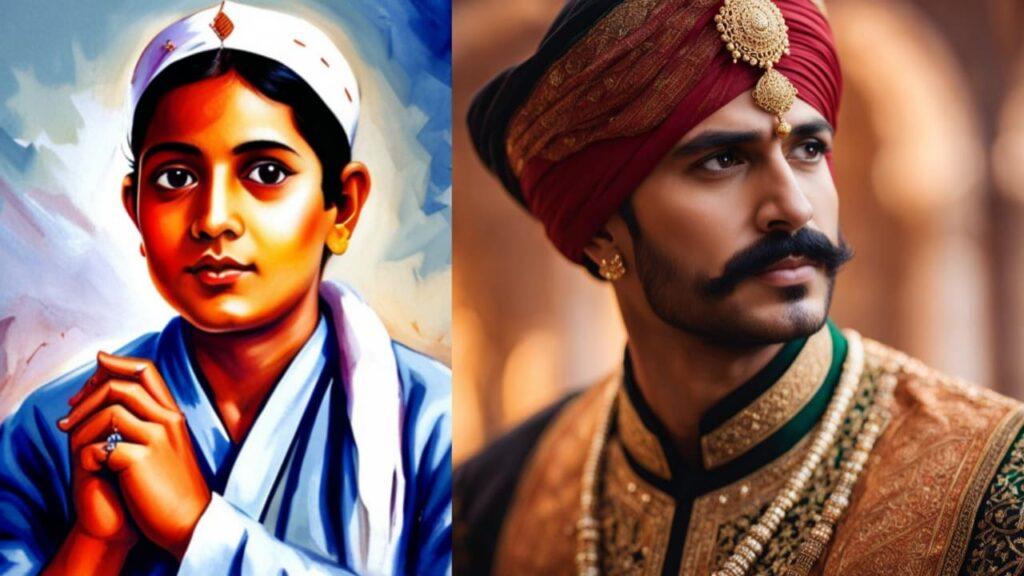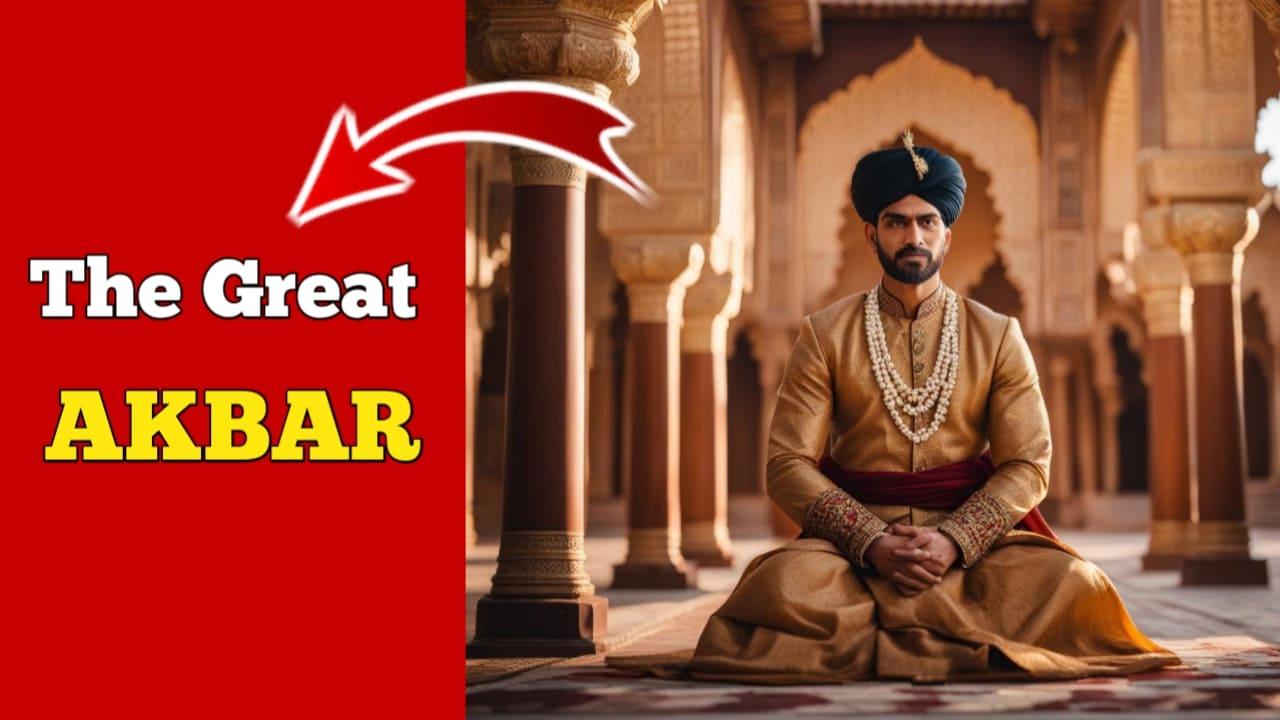Objectives
The superiority of Akbar among the Indian Mughal rulers is undeniable. In fact, he is counted among the great rulers of the world. The purpose of this lesson is to discuss the various conquests made by Akbar the Great from the early life of Akbar the Great till his entry into India, his tenure under the patronage of Bairam Khan, his ascension to the throne, the second battle of Panipat.

Introduction
Jalaluddin Akbar was born on 15 October 1542 in Amarkot. This was the time when Humayun was wandering here and there in Singh after being defeated by Sher Shah.
At the time of Akbar’s birth, Humayun had taken refuge at the place of Rana Virshal of Amarkot. Leaving his Begum Hamida Banu in the palace of Virshal, when Humayun, with the help of Virshal, was marching for the purpose of invading Thatta and Gakkhar, he encamped on the bank of a pond, about thirty miles south-west of Amarkot.
That one of his horsemen named Tardiveg Khan told the good news of the birth of his son. At that time Humayun’s condition was very pathetic, and was unable to distribute proper rewards etc.
To his fellow colleagues on this auspicious occasion; Nevertheless, he ordered a plate and, placing pieces of musk in it, distributed them among his companions and said, “On this occasion of the birth of my son, this is the only gift I can give to you at this time.
I hope and wish that the way The fragrance of this musk is spreading in this camp, similarly my son’s fame will someday spread all over the world.
In this way God may have listened to the words that came out from the heart of a father full of love and in course of time, the ability, foresight, generosity and nationalism that Humayun’s son showed as the ruler of India, it is not only It can be said to be unique in Indian history but also in world history.
This Mughal emperor of India was considered great not only for this country but for the whole world in all times.
Akbar’s Childhood
Akbar’s childhood was spent in many troubles. Akbar could not stay in the palace of Virshal for long.
On December 8, 1542, he was brought to Humayun’s camp at a place called Jun along with his mother Hamida Banu Begum. Humayun was still fighting his fate. When he did not get support from his brothers, he decided to get help from the king of Persia.
Humayun left for Kandhar with his wife and son. When he reached a place called Mustan (Mustang) in the south of Quent, he received news that his brother Askari was coming to attack him.
Finding himself unable to face Askari, he fled with his wife, leaving the infant Akbar there. Askari took him under his protection and took him to Kandahar. Since Askari had no children. So it could be expected that he would take care of the baby Akbar properly.
Hamida Banu Begum had left Jauhar Samsuddin Khan, Maham Anga and Jiji behind her to look after Akbar. In this way, Akbar had to be deprived of his father’s love and affection at a young age.
According to Asha, Askari took the baby Akbar to Kandahar and took good care of him there. Later, Humayun attacked Askari in September 1545 and conquered Kandahar with the help of the Persian Shah. Humayun could not get Akbar even after the victory of Kandahar because Askari had already sent Akbar to Kabul.
In Kabul, Babur’s sister Khanzad Begum brought up Akbar with great pampering. After the victory of Kandahar, Humayun attacked Kabul against Kamran and won Kabul. It was only after the victory of Kabul that Akbar again got the affection of his parents. Akbar was about three years old at that time.
According to Abul Fazl, on seeing his mother even after so many days, he went to her lap. It was here in 1546 AD on the occasion of his circumcision that he was presented before the public for the first time.
Smith wrote that his birth name was Badruddin, but on this occasion he was renamed Jalaluddin Muhammad Akbar. Humayun’s misfortune had not yet come to an end. When Humayun had gone to conquer Badakhshan, his brother Kamran recaptured Kabul.
Took over and took Akbar under his control. It is said that when Humayun returned and wanted to capture Kabul again, Kamran hanged Akbar in front of the fort wall and put him in front of the cannons raining fire, but Akbar’s luck prevailed. So he was saved and again got the love and protection of his parents. In this way, the early years of Akbar’s life were surrounded by sorrows and struggles.
Akbar’s education
When Akbar was five years old, Humayun arranged for his education. It is said that many teachers were appointed for him one by one, but none of them could teach him to read and write.
Akbar was more interested in sports than in reading and writing. Mentioning about Akbar’s education, Jahangir has said in his Tuzuk, that- “Though his father was illiterate, yet he had gained
such a deep acquaintance with various places in the field of knowledge, and he used so much in the discussion of a subject.” It was unimaginable for any human being to consider him literate”.
According to Abul Fazl “his sacred heart and worshiped soul never had any interest in external reading and writing.
Despite his indifference towards literacy, his knowledge of the excellent scriptures was a sign for the whole human being that the emperor did not get knowledge and understanding of all the subjects, but all this was God’s boon for him, whose development There was no place for human labor in this.
” In this way, the historians of the past have considered Akbar to be completely illiterate, but on the basis of modern research, it has been proved that even after not being literate, Akbar was not ignorant.
Spiritual literature, poetry By association with many scholars of philosophy, history and other scriptures, or by listening to the recitation of books, he had acquired very detailed knowledge.
His memory power was so sharp that only by listening he could get information about the deepest subjects, his thinking was clear. and his eloquence was surprising. In this way, it does not seem reasonable to consider Akbar illiterate from any point of view.
Apart from this, his ability to use weapons, wrestling, horse-riding and many more, can be said to be unique in the arts of chivalry. He had a unique ability to judge. In short, it can be said that Akbar was an educated person from all points of view.
Military and administrative experience
He had received military and administrative training in the beginning of his life. After the death of Hindal in 1551 AD, at the age of nine, Akbar was appointed as the governor of Ghazni and he was also betrothed to Hindal’s daughter.
Till the time of Humayun’s departure for the reconquest of Hindustan in 1554 AD, he remained there nominally as its governor. Humayun appointed Munim Khan as the guardian of Akbar shortly after leaving for Hindustan re-conquest.

Akbar was declared Humayun’s crown prince after Sher Shah’s nephew and a successor to the throne of Delhi, Sikanda Sur, was defeated at a place called Sirhind on January 22, 1555.
The credit for defeating Sikandar Sur in Sirhind is given to Akbar. A few weeks after the conquest of Delhi by Humayun, Akbar was made the governor of Lahore and the famous Turk general Bairam Khan was appointed as his guardian in place of Munim Khan.
At this time Akbar was thirteen years old, Munim Khan was appointed as the guardian of Humayun’s second son Mi Hakim in Kabul.
Akbar’s coronation (1556 AD)
With the help of Bairam Khan, when Akbar was engaged in suppressing the Afghan power in the west (Sikandar Sur, who was hiding in the fort of Mankot, was arrested on January 27, 1557 AD, located in Shermandal, Delhi.
Humayun’s death was reported at Kalanaur due to a fall from the steps of the library. After receiving the information, Bairam Khan got a brick throne built in a garden in Kalanaur and Akbar was crowned on it on 14 February 1556.
On the occasion of this coronation, Akbar was declared the emperor of the whole of India in the name of ‘Jalaluddin Muhammad Akbar Badshah Ghazi’.
Difficulties before Akbar (Difficulties at the time of his accession)

For Akbar, the kingdom was not a bed of flowers. He had many difficulties before him. He felt that he was surrounded by problems from all sides. In the words of Smith- “At the time of his coronation at Kalanir, he could not be called the master of any territory.
A small army under the leadership of Bairam Khan was by force only nominally in possession of some districts of the Punjab and that army Even this could not be fully trusted.
Before he could be emperor in the real sense, he had to prove that he was superior to rival claimants to the throne, and at least to recover the lost kingdoms of his father.
” The Afghan power was still active. At the time of his accession, Akbar was only a nominal ruler of some part of Punjab. After the death of Humayun, Hemu captured Delhi and Agra. In Punjab too, Sikandar Sur had become a contender for Akbar’s power.
The area of Kabul had almost become independent from the suzerainty of his half-brother Mizan Hakim. Afghan leaders like Muhammad Adilshah, Ibrahim Shah Suri, Muhammadshah were challenging his power.
Adilshah’s minister Hemu himself also desired to become the emperor of India. Apart from this, the Afghan Sardars had established their independence in Gwalior, Malwa and Bihar etc. Although there was a feeling of mutual hatred and hatred among them.
If they tried to implement their plans by joining forces, it would have been impossible for Akbar to suppress them. Many Rajputs in Rajasthan were engaged in expanding their power independent of the dominant empire.
The rulers of Mewar, Jaisalmer, Amer etc had become so powerful at this time that it was a difficult task for Akbar to control them. Was . Similarly, the rulers of Malwa, Gujarat, Gondwana etc. also became completely independent.
The power of the Portuguese in the Arabian Sea was also increasing day by day, which was a challenge for Akbar, on the other hand, it is acceptable that the Mughals had authority over Kabul, Kandahar, Badakhshan, but Akbar did not expect any help from these Mughal princes.
Could have done Apart from this, there were some Mughal princes like Mirza Hakim who had become independent in their respective areas and started challenging Akbar.
Similarly, Akbar’s half brother, Mirza Hakim, the ruler of Kabul and Mirza Sulaiman in Badakhshan were completely independent in their respective areas. Then the vulture eye of the Shah of Persia was fixed on Kandahar. Akbar also had personal difficulties.
At the time when Akbar was crowned, his age was only 13 years. It seemed difficult for this small child to look after the various parts of governance, to keep the empire safe from internal and external attacks, to expand the empire properly and to establish peace and order in the country by suppressing rebellions and conspiracies.
The economic condition of the country was also pathetic, due to continuous series of wars, crops and land had been ruined. There was famine all around. There was severe famine in Delhi and Agra.
Along with this, the outbreak of the epidemic was spread in many cities of India. Due to which innumerable people died and man started eating man. Groups of cannibals got organized to catch a few persons alone.
The royal treasury was almost empty. The people were not ready to pay taxes. In these adverse economic conditions, Akbar had to face severe difficulties in organizing and expanding the Mughal Empire.
Thus it is clear that after being enthroned, both internal and external difficulties prevailed in front of Akbar. Initially, two important problems came before Akbar, first, the opposition of Hemu, the Hindu prime minister of the Afghan ruler Muhammad Adil Shah, and second, the opposition of the Mughal Sardar Abul Mali.
Akbar first pacified Avulmali’s rebellion. Abul Mali’s pride was greatly inflated due to the special favor of the late Emperor Humayun. He had become hysterical and started behaving rudely with the emperor and other senior officials.
On 14 February 1556, he refused to attend Akbar’s coronation. Due to this rudeness of his, Bairam Khan made him a prisoner. Cheram Khan wanted to kill him, but due to Akbar his life was saved. Later he was imprisoned in the fort of Lahore, but Abul Mali escaped from the fort of Lahore. He was caught again.
And was made a prisoner and sent to the fort of Bayana. Akbar now had to deal with Hemu, the prime minister of the Afghan ruler Muhammad Adil Shah. Hemu was the prime minister of Adil Shah and Adil Shah had ordered Hemu to drive out the Mughals from India.
In fact, the biggest problem in these difficulties was Muhammad Adil Shah, who had the area from Sambhal to Bihar under his control. Adil Shah himself was not capable, but his vizier and general Hemu was undoubtedly capable and with the orders of Adil Shah, he had started moving further towards Agra and Delhi with a view to take control of them.
In such a situation, the security of the Mughal Empire was very uncertain. Hemu, a resident of Rewari, was a very capable and meritorious person of the Vaish caste. In the service of the Afghan state, he was first appointed as a weighing officer in the market.
Later, seeing his ability and cleverness, Islam Shah appointed him to an important post. During the reign of Adil Shah, his position and prestige increased further and in the end he became the prime minister of the emperor.
He had courage, patience and a unique ability to conduct military operations. He fought many battles on behalf of Adil Shah and defeated his rivals many times. Hemu had defeated Ibrahim Sur and Subedar Muhammad Shah of Bengal many times.
When Humayun took control over Delhi and Agra, Adil Shah ordered Hemu to proceed with the aim of making these areas independent from the Mughals. Hemu created trouble for the Mughals with his bravery. Humayun died when he was marching to attack Agra.
This was a golden opportunity for Hemu. Taking a huge army, he broke down on Agra via Gwalior. For Iskandar Khan, the Mughal ruler of Agra, Hemu found it impossible to face the huge army, and he fled in fear towards Delhi.
About three thousand Mughal soldiers were killed in this escape and run of Iskandar Khan. Hemu at Agra The right was done and he also got a huge amount of money in his hand. After Agra, Hemu quickly moved towards Delhi.
Delhi’s Subedar Tardi Beg Khan faced Hemu at Tughlaqabad on 7 October 1556 AD, but Hemu defeated him too. After this defeat, Tardi Veg Khan fled towards Punjab along with Iskandar Khan.
When Subedar Alokuli Khan of Sambhal came to know about these successes of Hemu, he also left his post and ran away with these people. In this way, the entire area of Sutlej river from Gwalior came under the control of Hemu.
Now Hemu became an independent ruler assuming the title of King Vikramaditya. Akbar’s campaign against Hemu: Akbar received the information about the fall of Delhi, the escape of Trading and the coronation of Hemu in Jalandhar.
The situation was undoubtedly critical. Akbar became distraught seeing all the other states except Punjab coming out of his hands. Due to inexperience, he did not have confidence in himself and kept gazing at Khan Baba Bairam Khan.
Bairam Khan called a meeting of the Mughal nobles and in this meeting he expressed the idea of facing Hemu, but other chieftains advised Akbar to return to Kabul, because at that time the number of Mughal soldiers was not more than 20000, while Hemu’s army,
On the other hand, consisted of about 100,000 soldiers, who at this time were overwhelmed with enthusiasm, but Vairam Khan was determined to recover Delhi and Akbar heartily agreed with his patron’s decision.
Akbar left Jalandhar on 13th October to face Hemu. Sirhind and the three fugitive governors of Agra, Delhi and Sambhal met Akbar and they also advised him to return to Kabul. With the permission of Akbar, Bairam Khan killed Tardiweg Khan with a sword to keep these people silent.
Although the historians of the time have termed this act of Bairam Khan as inappropriate on the basis of any personal animosity towards Trading, yet it has to be accepted that this work is necessary to remove the feeling of despair and hopelessness from the army and to re-instill confidence and courage in it. It was and the result was also good. The Mughal army got organized and started towards Delhi.
| EDUCATION WORLD | click here |
How many kids did Akbar have?
Akbar had two wives, Hasan and Hussain, two sons from the first wife, while Murda Mirza, Dariyal Mirza and Jahangir had three sons from the second wife. Altogether, Akbar had five children.

